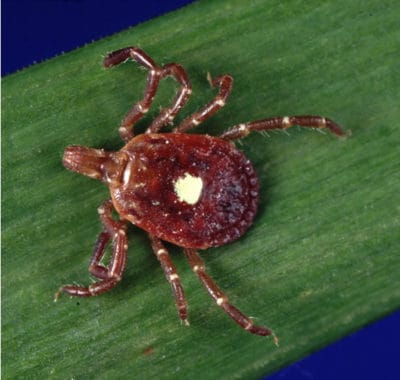
When we hear of tick bites, we often think first of Lyme disease, which can start off in the form of a fever, headache, fatigue and muscle aches but will later progress into something much more serious and even fatal if left untreated. Dogs can contract the disease from ticks, which is why it’s important for them to be treated for fleas and ticks as a prevention method. But is there more you need to worry about when it comes to tick bites? Scientists and recent studies say yes.
The problem may be reserved for those that are bitten by one tick, the Lone Star tick, but people are still worried just the same because a bite from a Lone Star tick has been associated with something truly horrifying to most people: a sudden allergic reaction to red meat.
That’s right. Recent findings have shown that people that visit the doctor after complaining about an all-over rash, extremely itchy rash were suffering from an alpha-gal allergy. This rash and other symptoms associated with the allergy, such as runny noses or becoming nauseated after eating meat, are the product of an allergic reaction to a carbohydrate sugar found in meat.
“It’s not the classic ‘my throat is closing when I eat peanut butter,’ reaction,” according to Dr. Scott Commins, an associate professor of medicine in the division of rheumatology, allergy & immunology at the Thurston Research Center at the University of North Carolina, Chapel Hill. “These [patients] would get hives and talk about G.I. distress, or needing to go to the restroom, and itching and swelling. Some would have to go to the ER to get treated.”
Red meat, including beef, pork, and lamb, is not common when it comes to foods that people are allergic to, and the rare allergy was first documented and diagnosed just over a decade ago at the University of Virginia. Described as somewhat of an anomaly, doctors believed that the 24 patients that were found with the allergy were just an isolated group that was exposed to the same set of ticks.

Doctors could not have been more wrong; since the first set of diagnoses, doctors in the Southeastern region of the U.S. have seen a huge uptick in the number of cases. Some see new patients as often as once or twice per week, which is both alarming and very interesting. What’s even more shocking is that the cases aren’t isolated to the Southeast, which is where the ticks are, but the patients from around the country still have the tick bites in common. Researchers speculate that this is because warmer temperatures have encouraged the ticks to expand their living areas to more corners of the country. Of course, it took doctors a while to put two and two together and determine that tick bites played a role in this sudden allergy.
“The question was: what in the world is happening to these patients that they all of a sudden develop an allergy to steak they ate successfully for 40 years?” he said, adding that the patients were in areas with high incidents of rocky mountain fever from the Lone Star Tick. “We wondered could this be due to tick bites? and we went back and started asking our patients and fortunately almost to a tee all of them said had a history of tick bites.”
Despite being horrified that they are now allergic to red meat, patients are often relieved to discover what it is that’s wrong with them. For those that now understand the reason they were so itchy they would scratch until they bled or why they were suddenly extremely tired, it can be so validating to now know what it is they’ve contracted.
Diagnosing the disease is no easy feat because it’s so unusual and the most obvious symptoms don’t show up until 6-8 hours after meat consumption. Pay attention to the warning signs, which include an itchy rash, nausea, and inexplicable stuffy or runny noses, and wear bug spray whenever entering the territory of ticks if you want to avoid the long-term effects.


